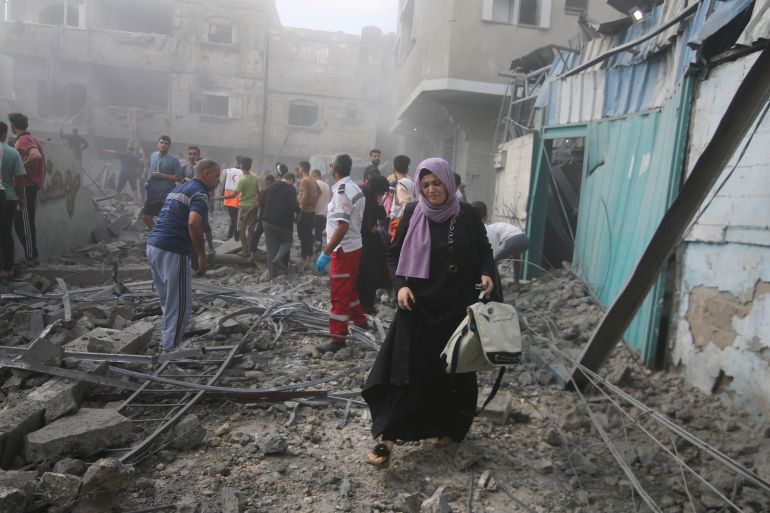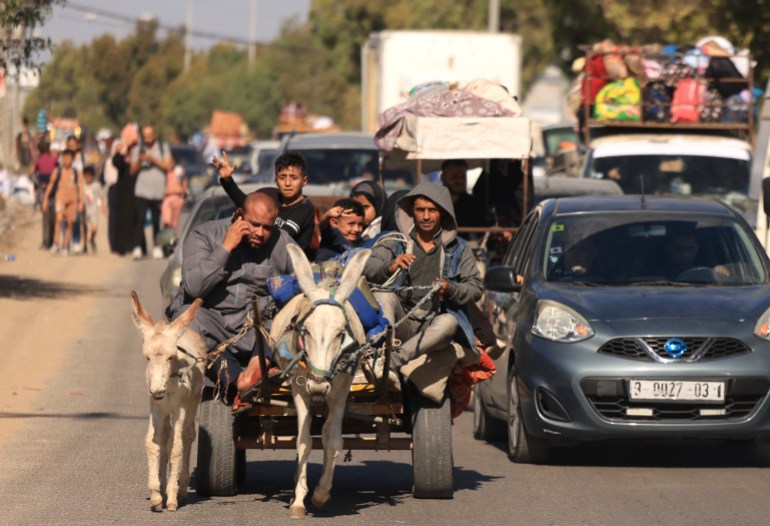‘Nowhere safe to go’: Confusion, fear after Israel’s warning to evacuate
Gaza residents say they are unable to leave following Israel’s call to move south ahead of a threatened ground invasion.

Twenty-one-year-old Mohammed Elewa has barely gotten any sleep this past week in the Gaza Strip.
The sound of Israeli bombs and Palestinian ambulance sirens is a constant background noise as Israel pounds the Strip in revenge for a surprise attack by Hamas on Israel on October 7.
Keep reading
list of 3 itemsAt least 16 Palestinians killed by Israeli forces in occupied West Bank
Journalist killed, six people wounded in Israeli attack on south Lebanon
On Friday morning, he woke up to the news that the Israeli military had issued evacuation orders for more than a million people in the northern Gaza Strip – nearly half of a total of 2.3 million residents.
The directive comes ahead of a feared ground invasion, but Elewa did not feel there was any point in leaving.
“There’s nowhere safe to go. Where am I supposed to go?” asks Elewa on the phone from his home.
He is one of many in Gaza City who say they have to stay because they cannot make their way to the south.

‘There was no space’
In a press statement, the Hamas leadership called the Israeli order “psychological warfare”.
“The current developments in Gaza represent an extraordinarily audacious and brutal endeavour to forcibly remove the Palestinian people from their land,” said Izzat al-Risheq, a member of the Hamas political bureau.
Elewa ended up staying in Shujayea with some cousins and sisters, while others in his family went to the schools being used as shelters or to relatives in the south.
More than 270,000 displaced people have sought refuge in 88 schools run by UNRWA, the UN agency providing assistance to Palestinian refugees, in the northern Gaza Strip.
But the overcrowding was such that, in some cases, “there were already 50 people to a room”, the paracyclist, whose leg was amputated when he was injured in the Gaza border protests five years ago, said.
“I wanted to go with them [my family], but there was no space,” Elewa, said.
“[Now], they’re asking everyone to leave, but there’s literally nowhere to go. They’re just telling us to go stand in the street,” he adds, a mix of panic and anger in his voice.
A loud explosion sounds on the other end of the call and the phone connection is cut.
At least 1,300 people were killed in the attack on Israel, while at least 1,799 Palestinians including 583 children have been killed in Israel’s bombardment of Gaza.

Death sentence for the vulnerable
The United Nations has called on Israel to rescind the evacuation order, saying the movement of people on that scale is “impossible” without dire humanitarian consequences.
Thousands of people were seen heading south on vehicles and on foot on Friday, clutching their children and meagre belongings.
But many cannot leave – like the many patients in Gaza’s overstretched hospitals.
“[It is impossible] to evacuate Al-Shifa hospital,” Dr Yusuf Abu al-Rish, Gaza’s deputy health minister, said in a message to reporters, referring to the Gaza Strip’s largest hospital, which is stretched well over its 500-bed capacity.
“All the other hospitals are full of injured patients,” Abu al-Rish added.
“Most cases are not stable enough to be transported,” he said. “Even if there is a decision [to evacuate], it’s not applicable at all.”
Tarik Jasarevic, spokesperson for the World Health Organization in Geneva, said it would be impossible to evacuate vulnerable hospital patients and such a move would be a death sentence for many.

‘No one can speak’
“I saw a lot of people earlier today escaping on trucks, donkeys, cars,” 33-year-old journalist Mohammed Abu Safia said from Gaza City. “I saw up to 10 people in one car.”
Abu Safia, who has already lost many members of his extended family in the past week, had come to Gaza City from Beit Lahiya in the far north of Gaza after the Israeli order.
He was sheltering in a church-run school with his young family of four.
“If you look at the people, you can see fear in their eyes, no one can speak,” said Abu Safia. “If I try to interview someone, they start arguing with me. No one can think straight.”
‘World leaders should speak up’
“I watched those videos [of people fleeing] today and I cried,” 36-year-old Wafaa al-Qudra told Al Jazeera.
“[Israel] knows we are in a state of war and there are no means of transport,” al-Qudra added, “Are they just trying to humiliate people?”
“This order does not alter Israel’s obligations in military operations to never target civilians and take all the measures it can to minimise harm to them,” said Clive Baldwin, senior legal adviser at Human Rights Watch.
“The roads are rubble, fuel is scarce, and the main hospital is in the evacuation zone,” he added. “World leaders should speak up now before it is too late.”
“The south is being bombed,” al-Qudra said, explaining why she decided to not try to evacuate. “My family lives there and they say the bombing didn’t stop for a minute.”
Meanwhile, Elewa, the paracyclist, gets back in touch with news he has survived the earlier bombing and is preparing for another frightening night under Israeli bombardment.
“There’s absolutely no sleep that’s happening at all,” he says. “Everyone’s just on edge, just waiting.”